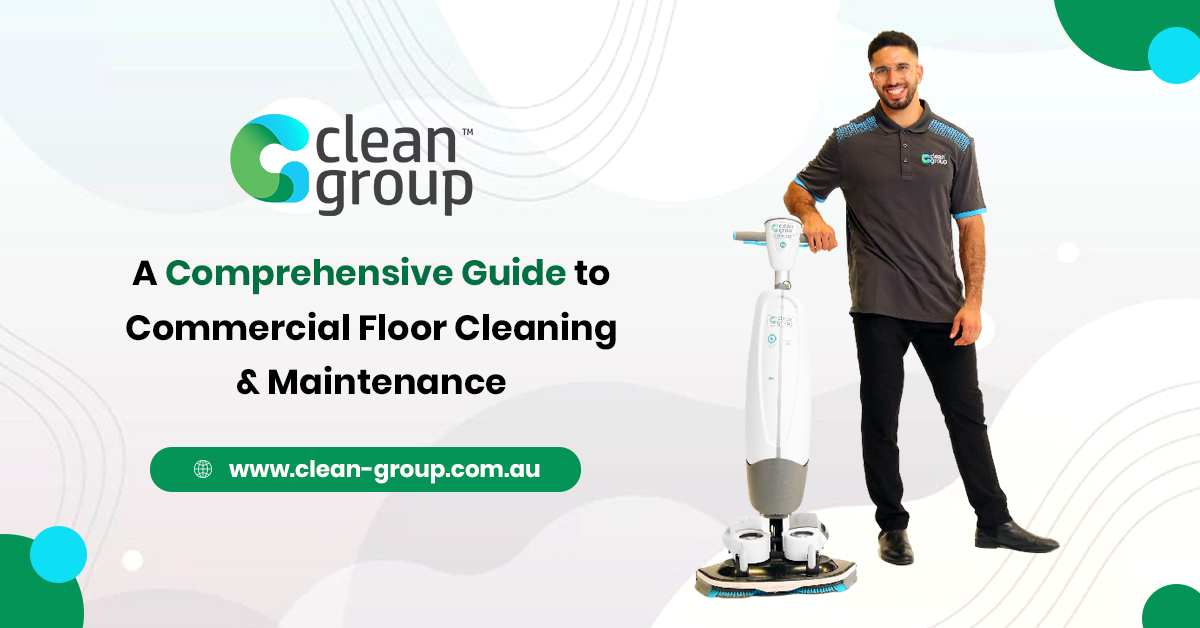Floors are usually the dirtiest part of any commercial facility. Whether it’s an office, a retail store or a hospital, when the floors are being used by hundreds of people, visitors & customers throughout the day, they are expected to be dirty.
The good news is that proper and regular commercial cleaning of office floors can help keep them attractive and germ-free. Here’s everything one needs to know about commercial floor cleaning and maintenance, including how to do it yourself.
Why Commercial Floor Cleaning Is Important
Germs Thrive in Dirty Areas.
In offices and other commercial cleaning facilities like factories, shops, hospitals, gyms, etc., floors are constantly used by hundreds of people, and so they get dirty very fast. Dust, dirt, and germs from outside get carried along with the shoes of the visitors and left on the office floors.
When left unattended for a few days, but used regularly, the commercial floors start looking bad, dirty and unclean. This is bad for the business reputation.
No one would like to visit again a facility that has been poorly maintained or is dirty. And this hampers the market reputation and value of the business and can cause serious trouble in the long term.
And that’s not even the worst part.
Floors in a commercial building can get very dirty very fast, and dirty places attract germs. In general, one can expect to find hundreds of varieties of germs on commercial floors, especially the ones that haven’t been cleaned properly in ages. And certain types of commercial floors such as hospitals and gyms are likely to have more germs than others because of the sensitive nature of these premises.
According to a study, uncleaned hospital floors having bacteria could contribute to spreading the infection.
Regular commercial floor cleaning is important not only to keep the floors looking beautiful and attractive but, more importantly, to prevent them from becoming a potential source of infection and to keep people safe from germs and bacteria on floors.
Routine cleaning of floors is also crucial for premises like restaurants and grocery stores that deal with foods and similar eatables.
What Is the Ideal Cleaning Frequency for Commercial Floors?
Well, basic cleaning, including vacuuming high traffic areas of the floors and carpets, tiles, hardwood, etc. must be cleaned daily. Any spills and other stains must be cleaned instantly as they occur.
Weekly mopping of tile floors and hardwood floors is recommended to keep the floors shining.
Deep cleaning, including carpets, tiles, grout and all, is essential at least once a month, especially in healthcare facilities and restaurant kitchens. If monthly deep cleaning is not possible, clean the carpets, tiles, and floors at least once every quarter.
Wax tiles and floors must be cleaned yearly or twice a year.
Commercial Floor Cleaning Supplies
Here are the things you would need to clean a commercial floor:
- High-powered vacuum cleaner
- Buckets
- Microfiber mop
- Carpet protector
- Stain remover
- Tile cleaner
- Floor/tile scrubber (I-Mop)
- Drop mop or broom for sweeping
- Microfiber cloths
Best Commercial Floor Cleaning Supplies for Different Kinds of Floors
There are many types of commercial flooring. While hardwood flooring and Concrete flooring are the most common types of flooring used in commercial facilities, other floor types including Vinyl floor, laminate floor, linoleum floor, and ceramic tiles are also not uncommon.
For commercial floor cleaning of different floor types, choosing the right cleaning product is crucial to ensure safe and desired results. For instance, using a harsh chemical-based cleaner on a hardwood floor can destroy its shine and quality.
There are different types of commercial floor cleaning products available in the market for different floor types. So, always choose the right cleaning product after research.
How to Clean Commercial Floors – a Step-By-Step Guide
Whether you are using a professional commercial cleaning service or doing it yourself, make sure that everything is covered when cleaning commercial floors. Here at Clean Group, cleaners are provided with a comprehensive checklist of the things they are supposed to do when cleaning commercial floors.
The Clean Group commercial floor cleaning process includes the following steps:
Step 1: Basic Cleaning
Basic cleaning, i.e. sweeping/vacuuming and mopping is recommended to be done daily. This helps keep the floors clean and removes any dirt, dust & debris that may have accumulated during the day.
The cleaners will first sweep all the floors, including tiles and hardwood, to remove visible dust and dirt.
Depending on the size and type of floors, all or only hard floors will be mopped using a wet mop and mild soap water. Hardwood floors are mopped less frequently, depending on the moisture resistance and durability of the wood. Microfiber cloths or thread mops are the best for mopping floors as against sponge mops.
If there are spots or stains on the floors, they should be dealt with during mopping. If not, the stains will be cleaned using a specialised stain cleaner. Spills or tea, drinks, etc. are recommended to be cleaned instantly before they become sticky.
Step 2: Deep Cleaning the Tiles & Grout
There are two ways to clean commercial floor tiles. For basic cleaning, mopping with a wet mop and floor cleaner is suitable, as it will remove simple stains and most of the germs.
Scrubbing is another method for tile cleaner, which is ideal for deep cleaning of tiles and grout. For the cleaning of commercial floor tiles, many professionals use automated floor scrubber machines, which both save time and produce efficient results.
At Clean Group, they use the I-Mop floor scrubber, which is by far the most advanced scrubbing technique for industrial floors and produces outstanding results with little water and in half the time of a regular scrubber.
Before starting to mop, make sure that the floor has been swept properly and there is no dirt or debris on it. Use a good quality mop and TGA-approved floor cleaner.
For mopping large floors, automated machines can be used. Use fresh water to mop different floors in different areas of the property. When done mopping, use a microfiber cloth or mop to buff and dry the floors.
Scrubbing can be done manually using a floor scrubber brush (for small floors) or using an automated machine such as the I-Mop scrubber.
Deep scrub the tiles and grout with a floor scrubber or use the machine. Re-seal tile grout at least once a year. Mopping is also a good way to keep the grout clean and prevent them from staining.
Avoid using harsh chemicals for grout cleaning, as they might make the grout porous, causing them to absorb moisture and stains. Use a natural grout cleaner or floor cleaner to clean the grout. Baking soda with dish soap is also a good home-based alternative for grout cleaning.
Step 3: Cleaning Hardwood Floors
Many businesses, especially offices in Sydney, have hardwood floors. While these wooden floors look great and make the place look more beautiful and impressive, they are not easy to clean and maintain. Why? Because not all hardwoods are resistant to water and moisture.
Hardwood floors need extra attention and must be cleaned with care.
For the basic cleaning of hardwood floors, daily cleaning with a broom is perfect.
Damp-mop the floors with a microfiber mop once a week or as required. Make sure to avoid using too much water for mopping and clean any excess moisture immediately. Also, check before to make sure that the floor can withstand some moisture.
Avoid using a chemical-based hardwood floor cleaner, as it might damage the wood. Rather, use a home-based or natural floor cleaner with a specific pH balance. DO NOT use regular floor cleaners on a hardwood floor.
Cleaning toilet floors is also very important. Basic floor cleaner or dishwashing soap with water should do the job.
Step 4: Disinfecting Floors
Disinfecting is an essential step in commercial floor cleaning, which is often neglected by regular cleaners. This is even more important in healthcare facilities, gyms, and restaurants. Disinfecting is the process of removing germs from the floors using specialised chemicals that are certified to remove germs and bacteria.
Professional commercial cleaners use disinfectants along with commercial sprayers for sanitising floor tiles.
In the aftermath of the COVID-19 pandemic, it has become more important than ever to keep commercial premises well cleaned and sanitised. Professional disinfection cleaners can help disinfect a commercial facility with guaranteed germ removal.
Ideally, a commercial property must be fully disinfected at least once a month, and more sensitive premises such as hospitals and restaurants must be disinfected more frequently.
The Clean Group team uses the globally recognized Electrostatic Disinfection method along with TGA-approved disinfectants for commercial premises like offices, hospitals, childcare centres, schools, and others. This method of disinfection is quick and certified to remove up to 99.99% of germs, including the coronavirus, from commercial floors and surfaces.
Why Hire Professionals for Commercial Floor Cleaning in Sydney
Now, when looking for routine cleaning and maintenance of the office floors, a business has two options – do it yourself or hire a professional.
The first option, or do it yourself, is inefficient for many reasons. For one, when running and managing a business, the person may hardly have the time to clean the floors. Also, this is something janitors are trusted with. DIY cleaning can be hectic and time-consuming, and without any professional cleaning knowledge, experience & or resources, the results may not be close to perfect.
On the other hand, hiring professional commercial cleaners for floor cleaning is both efficient and cost-effective. Professional cleaners are experienced and have the right resources for in-depth floor cleaning. They have a keen eye to identify and clean the areas that are generally missed. Also, they can remove germs and bacteria more effectively, ensuring all-around protection.
Companies like Clean Group offer customised cleaning options, so you only have to pay for what you use. In other words, their floor cleaning services are not just efficient but also cost-effective.
And they do have 20+ years of experience in commercial cleaning, including floor cleaning in offices, hospitals, restaurants, stores, and factories. Plus, they offer a 100% satisfaction guarantee with all commercial cleaning jobs. Contact Clean Group today for a FREE onsite quote.
Clean Group provides complete commercial cleaning services and solutions. Their office cleaning Sydney services are all-inclusive and cover the cleaning of floors, hard surfaces, carpets, doors, windows, sofas, chairs, desks, toilets, kitchens, cafeteria, etc. along with disinfection of high traffic areas and touchpoints.

